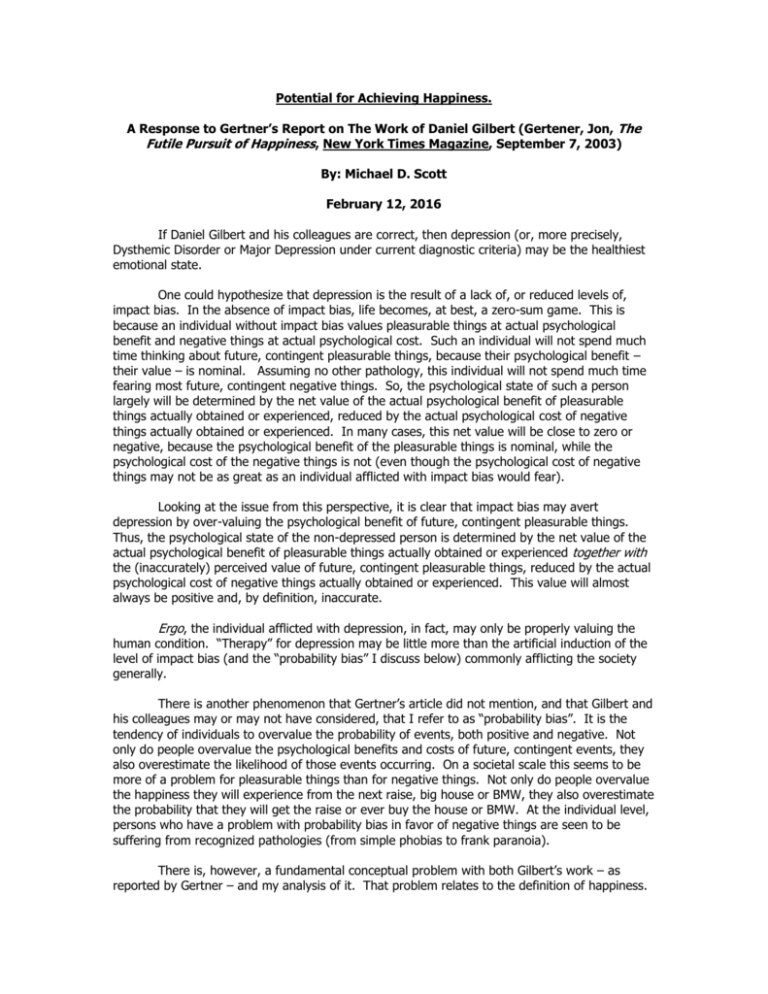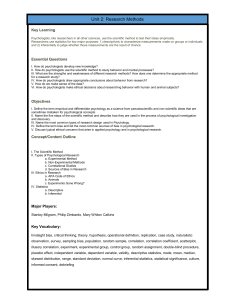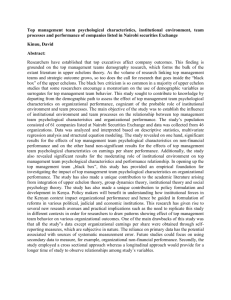
Potential for Achieving Happiness.
A Response to Gertner’s Report on The Work of Daniel Gilbert (Gertener, Jon, The
Futile Pursuit of Happiness, New York Times Magazine, September 7, 2003)
By: Michael D. Scott
February 12, 2016
If Daniel Gilbert and his colleagues are correct, then depression (or, more precisely,
Dysthemic Disorder or Major Depression under current diagnostic criteria) may be the healthiest
emotional state.
One could hypothesize that depression is the result of a lack of, or reduced levels of,
impact bias. In the absence of impact bias, life becomes, at best, a zero-sum game. This is
because an individual without impact bias values pleasurable things at actual psychological
benefit and negative things at actual psychological cost. Such an individual will not spend much
time thinking about future, contingent pleasurable things, because their psychological benefit –
their value – is nominal. Assuming no other pathology, this individual will not spend much time
fearing most future, contingent negative things. So, the psychological state of such a person
largely will be determined by the net value of the actual psychological benefit of pleasurable
things actually obtained or experienced, reduced by the actual psychological cost of negative
things actually obtained or experienced. In many cases, this net value will be close to zero or
negative, because the psychological benefit of the pleasurable things is nominal, while the
psychological cost of the negative things is not (even though the psychological cost of negative
things may not be as great as an individual afflicted with impact bias would fear).
Looking at the issue from this perspective, it is clear that impact bias may avert
depression by over-valuing the psychological benefit of future, contingent pleasurable things.
Thus, the psychological state of the non-depressed person is determined by the net value of the
actual psychological benefit of pleasurable things actually obtained or experienced together with
the (inaccurately) perceived value of future, contingent pleasurable things, reduced by the actual
psychological cost of negative things actually obtained or experienced. This value will almost
always be positive and, by definition, inaccurate.
Ergo, the individual afflicted with depression, in fact, may only be properly valuing the
human condition. “Therapy” for depression may be little more than the artificial induction of the
level of impact bias (and the “probability bias” I discuss below) commonly afflicting the society
generally.
There is another phenomenon that Gertner’s article did not mention, and that Gilbert and
his colleagues may or may not have considered, that I refer to as “probability bias”. It is the
tendency of individuals to overvalue the probability of events, both positive and negative. Not
only do people overvalue the psychological benefits and costs of future, contingent events, they
also overestimate the likelihood of those events occurring. On a societal scale this seems to be
more of a problem for pleasurable things than for negative things. Not only do people overvalue
the happiness they will experience from the next raise, big house or BMW, they also overestimate
the probability that they will get the raise or ever buy the house or BMW. At the individual level,
persons who have a problem with probability bias in favor of negative things are seen to be
suffering from recognized pathologies (from simple phobias to frank paranoia).
There is, however, a fundamental conceptual problem with both Gilbert’s work – as
reported by Gertner – and my analysis of it. That problem relates to the definition of happiness.
Unfortunately, this raises issues – either philosophic or theological – on which there is no
fundamental agreement in the scientific community. Philosophically, it seems that the Gilbert
work has focused to a significant extent on materialistic pleasures (although admittedly some of
the work has involved interpersonal relationships and other non-materialistic goods). A definition
of happiness may be inaccurate to the extent it is rooted in the empirical, materialist traditions of
John Locke and David Hume. The issue can also be approached theologically with the same
result. In short, there are philosophical and theological approaches to happiness that are more
sophisticated than those Gilbert seems to have looked at. Viewing “happiness” in terms of
personal peace, achievement of goods for the benefit of others, or maximizing life’s potential
other than in material terms makes true happiness both achievable and worth achieving.
2003 – Michael D. Scott. All Rights Reserved.








